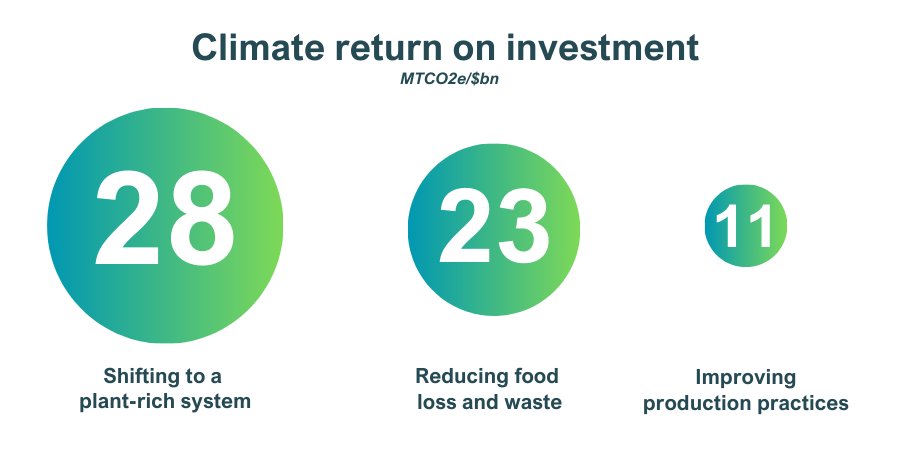Investing in a plant-rich food system can significantly reduce emissions from the agriculture sector, as well as delivering key nature and health benefits that other sectoral transitions cannot reach, says a new report published by Tilt Collective and Systemiq.
Per dollar invested, advancing a plant-rich food system offers five times the climate benefits compared to renewable energy and four times that of electric vehicles.
A new report published today by Tilt Collective and Systemiq, during ClimateWeekNYC, highlights the immense benefits of investing in a plant-rich food system as a climate strategy.
The report reveals that investing in this food system change offers 28MT CO2e per $1 billion invested – and is significantly more effective than some other approaches to reducing the agriculture sector’s vast emissions problem. Investments in plant-rich consumption and production yield 2.5 times the average reductions, compared to improvements in livestock and crop production, including the use of methane inhibitors.
While the world needs action on multiple fronts to meet our climate goals, a more plant-rich food system can also deliver benefits that other sectoral transitions cannot reach.
- Today our food system uses about 3.8 billion hectares of land. Delivering a plant-rich food system can release at least 1.6 billion hectares – an area the size of the US and China – that could be used for carbon storage or increased food production. This land sparing will also slow down global biodiversity loss by 40%.
- Delivering a plant-rich food system by 2050 has the potential to save 1,100 km3 of water – equivalent to the US and China’s current freshwater withdrawals. This shift would also reduce water pollution by 40%.
- This shift to plant-rich foods would also increase years of healthy life and result in $3.2 billion in economic savings annually by 2050 as rates of obesity and malnutrition reduce. The reduced risk of anti-microbial resistance and pandemics from fewer livestock would also create around $200 billion in economic savings by 2050.
All of this adds up to a “spectacular pay-off” as a climate investment, says Tilt Collective CEO Sarah Lake. “While we of course need investments in other sectors and food solutions as well, the data is undeniable: investments in plant-rich food systems, and shifting consumption and production patterns, offer exponentially more emissions reductions for the money spent”.
However, the transition is at an early – if promising – stage with only 2% of funding needs met today. Systemiq and Tilt Collective’s analysis suggests that an initial investment of $250-500 million from philanthropy in advancing a plant-rich food system could unlock $4-7 billion of public and private finance and create multiplier impacts, creating new market opportunities for farmers and accelerating the shift to a plant-rich food system.
“Advancing all transitions is essential to meeting our climate goals, but the investment opportunity in a plant-rich food system is impossible to ignore,” says Systemiq Partner Christine Delivanis. ”This transition remains vastly under-invested compared to the need. Philanthropies and ‘patient impact’ investors can serve as catalysts by fostering science-based knowledge, educating policymakers and stakeholders, funding behavioural interventions, and supporting key R&D initiatives.”


